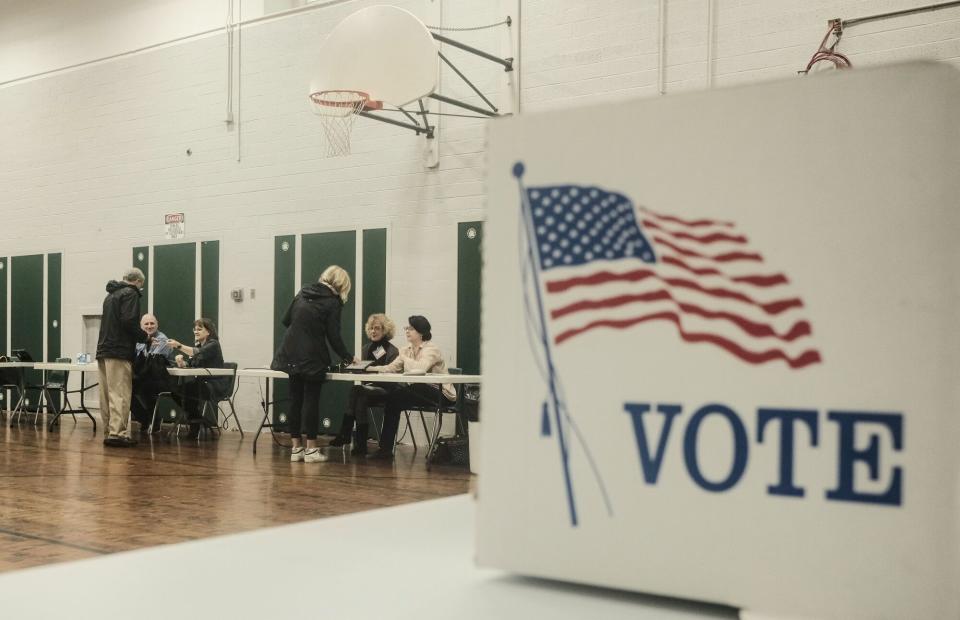Abortion on Ohio Ballot Seen as Test of Key 2024 Election Issue
(Bloomberg) -- Ohio voters decide Tuesday if access to abortion care should be enshrined in the state’s constitution. It’ll be closely watched nationally as a gauge of a key issue ahead of the 2024 US presidential elections.
Most Read from Bloomberg
Biggest Cross-Asset Rally This Year Takes Wall Street by Storm
Iceland’s Blue Lagoon on Alert for Magma Flows After Earthquakes
Israel’s Fight With Iran Proxies in Syria Poisons Russia Ties
Ohioans are considering a proposed amendment, called Issue 1, to prevent the state from interfering with reproductive decisions, including contraception, while allowing abortion bans with exceptions after fetal viability. It’s the only state with the issue on the ballot this fall.
If Issue 1 is successful in Ohio — a state that Donald Trump won twice easily — it’ll suggest that strict bans are out of step with a majority of voters and abortion rights could motivate Democrats and divide Republicans in the 2024 elections. If defeated, it could embolden Republicans, bolstering efforts to defeat similar measures in other states next year.
“If Ohio is unable to resist this sort of amendment, then I would assume a good chunk of states are in the same position,” said Mark Caleb Smith, director of the Center for Political Studies at Cedarville University. “If Ohio passes this, then I think this is going to be a very complicated issue for Republicans as they move forward.”
Republicans are adjusting to a new landscape when it comes to voter views on abortion after Roe v. Wade was overturned by the Supreme Court last year. The rollback of rights across the country prompted protests and boosted support for abortion access. Meanwhile, Republicans’ anti-abortion stance was among reasons for the GOP’s underwhelming showing in the midterm elections.
Anti-abortion referendums were defeated last year in Kansas, Kentucky and Montana, and abortion-rights measures passed in California, Michigan and Vermont.
No Exceptions
Ohio’s law that’s on hold pending a legal challenge currently bans abortions after about six weeks — before many women know they’re pregnant — with no exceptions for rape, incest and life of the mother. Invoking that restrictive ban and involving doctors in their campaign will likely help the Issue 1 proponents, said Celinda Lake, a pollster who worked on President Joe Biden’s 2020 campaign.
“If they win, this will be the road map for 2024 for most candidates and certain initiatives,” Lake said.
While abortion opponents have been outspent by supporters on ads $23.5 million to $15.4 million in Ohio, according to AdImpact, they’re still making an effective case against allowing abortions at any time, said Marjorie Dannenfelser, president of the anti-abortion group Susan B. Anthony Pro-Life America.
“If we win, we of course will use that momentum and the money raised and all that to go to the next states,” Dannenfelser said at a kick off for a door-knocking canvass by college students in suburban Columbus on Monday.
Issue opponents, including Ohio Republican Governor Mike DeWine, have argued that the amendment is too extreme in allowing late-term abortions. DeWine has appeared in television ads with his wife, Fran, saying the issue “goes too far.”
“The majority of Ohioans do not believe we should have abortion at any point leading up to birth,” he told reporters Monday at the door-knocking event. He called the proposed amendment “radical.”
But a USA Today Network/Suffolk University poll in July found that 58% of likely Ohio voters support enshrining abortion rights in the constitution, and a Baldwin Wallace University survey in October showed that 58% of likely voters favor Issue 1, including the majority of Democrats, half of independents and 39% of Republicans.
Ohio Department of Health data show that 89% of the 18,488 abortions in the state last year were performed before 13 weeks of pregnancy, and only 107 — or 0.6% — were done over 21 weeks. Those were “nightmare scenarios” where the fetus couldn’t survive or the mother’s life was in jeopardy, said Lauren Beene, a Cleveland pediatrician and co-founder of Ohio Physicians for Reproductive Rights, a group of more than 4,000 doctors that formed after the Supreme Court ruling.
Issue 1 would restore the rights that existed in Ohio under Roe V. Wade, Beene said, adding that opponents want to eliminate the procedure entirely “so they’re saying and doing everything that they can to get abortion banned.”
If Issue 1 is defeated, DeWine said he supports revisiting the state’s abortion law, including to provide exceptions in the case of rape and incest. If not, it’ll effectively end debate on the issue, he said.
But Gabriel Mann, a spokesman for Ohioans United for Reproductive Rights — the coalition supporting Issue 1 — is skeptical because DeWine and GOP lawmakers could have adopted less onerous abortion restrictions before and refused, he said.
“We know we have popular opinion on our side, but we have to actually get out the vote to win this election,” Mann said.
Michael Bloomberg, the founder and majority owner of Bloomberg LP, the parent of Bloomberg News, gave $1 million to the campaign supporting Issue 1.
(Updates with doctor’s comment starting in 14th paragraph.)
Most Read from Bloomberg Businessweek
These Five Countries Are Key Economic ‘Connectors’ in a Fragmenting World
Online Gambling Has Millions of Young Africans Battling Addiction
Shipping Startup Flexport Is in Crisis Mode Heading Into the Holiday Season
©2023 Bloomberg L.P.

 Yahoo News
Yahoo News 


